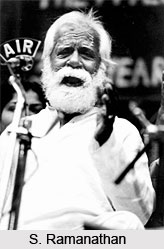 S. Ramanathan was born in the year 1917. He was a Carnatic singer and a musicologist. He took music lessons from Tiger Varadachariar, Sabesa Iyer, Ponniah Pillai, and Sathur Krishna Iyengar. He also got a Ph.D. degree in ethnomusicology from Wesleyan University, Middletown, Connecticut, where he also taught for few years as professor.
S. Ramanathan was born in the year 1917. He was a Carnatic singer and a musicologist. He took music lessons from Tiger Varadachariar, Sabesa Iyer, Ponniah Pillai, and Sathur Krishna Iyengar. He also got a Ph.D. degree in ethnomusicology from Wesleyan University, Middletown, Connecticut, where he also taught for few years as professor.
He, for most part of his life, had followers who carved names for themselves like P.Unni Krishnan, S. Sowmya, Savithri Sathyamurthy, Seetha Narayanan, Vasumathi Nagarajan, Sukanya Raghunathan (Veena), Geetha Bennett (Veena and a renowned short story writer in Tamil), Vidya Hariharan (Veena and Vocal), Thiagarajan/Raju (Vocal), Banumathy Raghuraman (Veena), Latha Radhakrishnan (Violin and vocal), Padma Gadiyar (Veena), Vanathy Raghuraman (Vocal)
S. Ramanathan also participated in several varnams and kritis that have been made popular by his disciples. He also won the Sangeetha Kalanidhi Award in the year 1985.
In the year 1981 S. Ramanathan released an album of Carnatic music, Navagraha Krtis (The 9 Planets), Caturdasa Ragamalika (The 14 Worlds) and Sri Guruna: By Muttuswami Diksitar (1775-1835), on Folkways Records.
Ramanathan died in the year 1988.
This article is a stub. You can enrich by adding more information to it. Send your Write Up to content@indianetzone.com




















